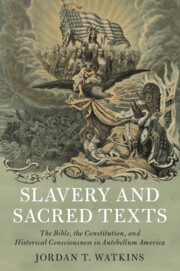 Slavery and Sacred Texts
Slavery and Sacred Texts Book contents
- Slavery and Sacred Texts
- Cambridge Historical Studies in American Law and Society
- Slavery and Sacred Texts
- Copyright page
- Dedication
- Contents
- Acknowledgments
- Prologue
- Introduction
- 1 “Recourse Must Be Had to the History of Those Times”
- 2 “The Ground Will Shake”
- 3 “Texts … Designed for Local and Temporary Use”
- 4 “The Further We Recede from the Birth of the Constitution”
- 5 “The Culture of Cotton Has Healed Its Deadly Wound”
- 6 “Times Now Are Not as They Were”
- 7 “We Have to Do Not … with the Past, but the Living Present”
- 8 A “Modern Crispus Attucks”
- Conclusion
- Epilogue
- Index
Introduction
Published online by Cambridge University Press: 12 June 2021
- Slavery and Sacred Texts
- Cambridge Historical Studies in American Law and Society
- Slavery and Sacred Texts
- Copyright page
- Dedication
- Contents
- Acknowledgments
- Prologue
- Introduction
- 1 “Recourse Must Be Had to the History of Those Times”
- 2 “The Ground Will Shake”
- 3 “Texts … Designed for Local and Temporary Use”
- 4 “The Further We Recede from the Birth of the Constitution”
- 5 “The Culture of Cotton Has Healed Its Deadly Wound”
- 6 “Times Now Are Not as They Were”
- 7 “We Have to Do Not … with the Past, but the Living Present”
- 8 A “Modern Crispus Attucks”
- Conclusion
- Epilogue
- Index
Summary
The introduction outlines the book’s argument that biblical and constitutional debates over slavery introduced a sense of historical distance from the founding era and the biblical past. It also defines key terms, including historical distance, sacred texts, and favored pasts, and outlines developments by which the Bible maintained its status as a sacred text, while the Constitution achieved a similar kind of status in antebellum America. These developments set the stage for the process by which debates over slavery began to historicize the biblical and constitutional pasts. This process corresponded with the broader emergence of a modern historical consciousness. And yet, the nature of American religious and legal culture, and the presence of slavery, gave unique shape to American historical awareness. The book makes its most innovative move in showing how slavery encouraged interpretive shifts to read both the Bible and the Constitution as historical texts. I focus on a range of thinkers and interpreters and read their writings with an eye toward measuring historical consciouness. This approach demonstrates that the crisis over slavery in America became a crisis of historicity.
Keywords
- Type
- Chapter
- Information
- Slavery and Sacred TextsThe Bible, the Constitution, and Historical Consciousness in Antebellum America, pp. 1 - 27Publisher: Cambridge University PressPrint publication year: 2021
